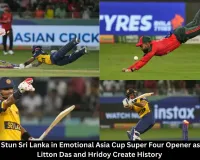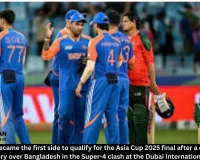The Trophy That Wasn't There: What Really Happened After India's Win?
Digital Desk
On September 28, 2025, the Dubai International Cricket Stadium witnessed an unprecedented event in sports history when the Indian cricket team won the Asia Cup but refused to accept the winners' trophy, leaving the presentation ceremony in disarray and the trophy unclaimed.
The core of the controversy was the person designated to present the trophy: Mohsin Naqvi. Naqvi holds three relevant roles: he is the President of the Asian Cricket Council (ACC), the organization that runs the tournament; the Chairman of the Pakistan Cricket Board (PCB); and Pakistan’s federal Interior Minister. The Indian team and its board, the BCCI, found it unacceptable to receive the trophy from a senior Pakistani political leader.
The On-Ground Chaos
The refusal led to a chaotic and awkward post-match ceremony that unfolded as follows:
Stalled Ceremony: After India's victory, the award presentation was delayed for over an hour. The stage was set, but an official eventually removed the Asia Cup trophy from the dais without explanation.
Awards Without the Trophy: Indian players received their individual medals from other dignitaries on stage, deliberately avoiding acknowledgment or handshakes with Naqvi, who was present. Pakistani players collected the runners-up cheque from Naqvi.
"Invisible Trophy" Celebration: With the physical trophy absent, the Indian team conducted a photo-op on the podium, with captain Suryakumar Yadav famously raising an "invisible trophy" as the team celebrated around him.
Official Confirmation: The ceremony host, former New Zealand cricketer Simon Doull, announced, "I have been informed by the Asian Cricket Council that the Indian cricket team will not be collecting their awards tonight," before concluding the presentation.
A History of Tensions
The trophy incident was not an isolated event but the culmination of weeks of rising tensions during the tournament, set against a backdrop of renewed military conflict between the two nations months earlier.
No Sportsmanship: In their three matches, Indian players refused to shake hands with the Pakistani team, a move criticized by Pakistan.
Dedications and Gestures: After the first match, Indian captain Yadav dedicated the win to the Indian armed forces, referencing a terrorist attack in Pahalgam from April. Pakistani players also made celebratory gestures on the field that were seen as references to the recent military clashes.
Precedent of "Cricket Diplomacy": The current rift contrasts sharply with the past, where cricket has been used as a diplomatic tool to ease tensions, including leaders from both countries watching matches together as recently as 2011.
Reactions and Justifications
In the aftermath, officials and players from both sides expressed their positions.
The Indian Stance: BCCI secretary Devajit Saikia confirmed the team's decision was a protest against the ACC chairman, who is "one of the main political leaders of Pakistan". Captain Suryakumar Yadav stated, "I think this is one thing which I have never seen since I started playing cricket... that a champion team is denied a trophy," emphasizing that the refusal was the team's own decision.
The Pakistani Response: Pakistani captain Salman Agha questioned the logic, stating, "If the ACC has a president, then it's his job to give the trophy. If you don't want to take it from him, then how else will you get it?".
The 2025 Asia Cup final will be remembered less for the cricket and more for a trophy that was won on the field but never physically held, a powerful symbol of how deeply political divisions can infiltrate the world of sports.

.jpg)

.jpg)




.jpg)


